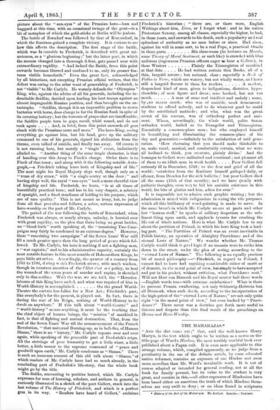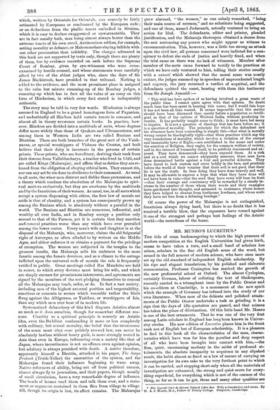THE MAHARAJAS.*
"AND the dirt came out ;" that, said the well-known Henry Martyn, is the text which might to be written as a motto on the title-page of Ward's Hindoos, the most terribly truthful book ever published about a Pagan cult. It is even more applicable to this. strange volume, which, compiled apparently, as we judge from a peculiarity in the use of the definite article, by some educated native reformer, contains an exposure of one Hindoo sect evert more merciless than Mr. Ward's invaluable work. It is not of course adapted or intended for general reading, not at all the book for family perusal, but its value to the student is very great, and consists in this,—all other exposures of Hindooism have been based either on assertions the truth of which Hindoos them- selves are very swift to deny ; or on ideas found in scriptures • History of the Sect of the Maharajas. Fo Author. Loudon : ;Enamor.
which, written by Orientals for Orientals, can scarcely be fairly estimated by Europeans or condemned by the European code ; or on deductions from the phallic tenets embodied in Sivaism, which it is easy to declare exaggerated or unwarrantable. They are in fact usually both, man being almost always better than the extreme tenets. of his own creed, Antinomians seldom, for example, setting morality at defiance, or Mahommedans slaying infidels with- out other provocation than infidelity. The charges advanced in this book are not supported by texts only, though there are plenty of them, but by evidence recorded on oath before the Supreme Court of Bombay, given by eye-witnesses who were cross- examined by hostile counsel, and whose statements were carefully sifted by two of the ablest judges who, since the days of Sir James Mackintosh, have presided in that tribunal. Nothing is added to the evidence, and the most prominent place is assigned to the calm but minute summing-up of the Bombay judges, a summing-up which has in fact all the value of an essay on this form of Hindooism, in which every fact stated is indisputably authentic.
The story may be told in very few words. Hindooism is always assumed in England to be a grand homologous form of Paganism, and undoubtedly all Hindoos hold certain tenets in common, and almost all in theory reverence certain books. In practice, how- ever, Hindoos are divided into a multitude of sects, whose dogmas differ more widely than those of Quakers and Ultramontanes, and among them in Western India are two called Banians and Bhuttias. These are both branches of the great sect of the Vaish- naves, or special worshippers of Vishnoo the Creator, and both believe that their deity is incarnate in the persons of certain priests. These priests, who are hereditary, deriving their rank from their descent from Vallabhacharya, a teacher who lived in 1520, and are called Kings (Maharajas), and affirm that as deities they are re- leased from the obligation of obeying ethical laws. They cannot sin, nor can any act be sin done in obedience to their command. As usual in all sects, the wiser men distrust and dislike these pretensions, and a theory which confines the absolutism of the Maharajas to spiri- tual matters exclusively, but they are overborne by the multitude and by the fanaticism of their women. As usual, too, in all sects which accept a system dispensing with ethics, the first law of morals set aside is that of chastity, and a system has consequently grown up among the Banians which is absolutely without a parallel in the world. The Banians and Bhuttias are numerous, influential, and wealthy all over India, and in Bombay occupy a position only second to that of the Parsees, yet it is certain that they sanction and conceal practices worse than any which have ever prevailed among the lower castes. Every man's wife and daughter is at the disposal of the Maharaja, who, moreover, claims the old Seignorial right of Auvergne, so often alluded to by writers on the Middle Ages, and either enforces it or obtains a payment for the privilege of exemption. The women are subjected in the temples to the grossest insults, the Maharaja sells his embraces to the more fanatic among the female devotees, and as a climax to the outrage inflicted upon the universal code of morals the sale is frequently ratified in public. Great meetings called Ras Mundulee are held in secret, to which every devotee must bring his wife, and which are simply excuses for promiscuous intercourse, and agreements are signed by the members of the sect pledging themselves to conceal all the Maharajas may teach, order, or do. In fact a vast society, including men of the highest external position and respectability, sanctions or consents to scenes which resemble rather the libels flung against the Albigenses, or Yezidees, or worshippers of Isis, than any which men ever hear of iu modern life.
Systematized debauchery of this kiwi disgusts Asiatics almost as much as it does ourselves, though for somewhat different rea- sons. Chastity as a spiritual principle is scarcely an Asiatic idea, even the Buddhist confounding it more or less completely with celibacy, but sexual morality, the belief that the intercourse of the sexes must obey some publicly avowed law, can never be absolutely lawless without heavy guilt, is more strongly rooted in Asia than even in Europe, influencing even a society like that of Japan, where incontinence is not an offence even against opinion, but adultery is always punished with death. A native therefore, apparently himself a Bhuttia, attacked in his paper, The Satya Prokash (Truth-Teller) the enormities of the system, and the
Maharajas found their influence beginning to wane away. Native reformers of ability, being cut off from political careers, almost always fly to journalism, and their papers, though usually of small circulation, have a very remarkable degree of influence. The heads of houses read them and talk them over, and a state-
ment or argument contained in them flies from village to village till, though its origin is lost, its effect remains. The Maharajas
grew alarmed, tithe women," as one calmly remarked, "being their main source of revenue," and no substitute being suggested, and one of them, named Judoonath, actually ventured to bring an action for libel. The defendants, editor and printer, pleaded justification, and the Maharaja thereupon obtained a decree from the sect sentencing any person who might appear as witness to excommunication. This, however, was a little too strong an attack upon the civil law, all persons concerned were indicted for a con• spiracy to defeat the ends of justice and heavily fined, and when the trial came on there was no lack of witnesses. Member after member of the sects came forward to testify to the practices at
which we have only ventured to hint, telling their stories usually with a naiveté which showed that the moral sense was nearly
extinct, the judges summed up in speeches of unprecedented length and cogency, the jury returned a verdict of acquittal, and the defendants quitted the court, bearing with them this testimony from Sir Joseph Arnould
" This trial has been spoken of as having involved a great waste of the public time. I cannot quite agree with that opinion. No doubt much time has been spent in hearing this cause, but I would fain hope it has not been all time wasted.. It seems impossible that this matter should have been discussed thus openly before a population so intelli- gent as that of the natives of Western India, without producing its results. It has probably taught some to think ; it must have led many to inquire. It is not a question of theology that has been before us ; it is a question of morality. The principle for which the defendant and his witnesses have been contending is simply this—that what is morally wrong cannot be theologically right—that when practices which sap the very foundations of morality, which involve a violation of the eternal and immutable laws of Right,—are established in the name and under the sanction of Religion, they ought, for the common welfare of society, and in the interest of humanity itself, to be publicly denounced and ex- posed. They have denounced—they have exposed them. At a risk and at a cost which we cannot adequately measure, these men have done determined battle against a foul and powerful delusion. They have dared to look custom and error boldly in the face, and proclaim before the world of their votaries that their evil is not good, that their lie is not the truth. In thus doing they have done bravely and well. It may be allowable to express a hope that what they have done will not have been in vain—that the seed they have sown will bear its fruit —that their courage and consistency will be rewarded by a steady in- crease in the number of those whom their words and their examples have quickened into thought, and animated to resistance, whose homes they have helped to cleanse from loathsome lewdness, and whose souls they have set free from a debasing bondage."
Of course the power of the Maharajas is not extinguished, fanaticism always dying hard, but there is no doubt that it has received a terrible blow, that the exposures have roused against it one of the strongest and perhaps best feelings of the Asiatic world—the sacredness of the home.































 Previous page
Previous page